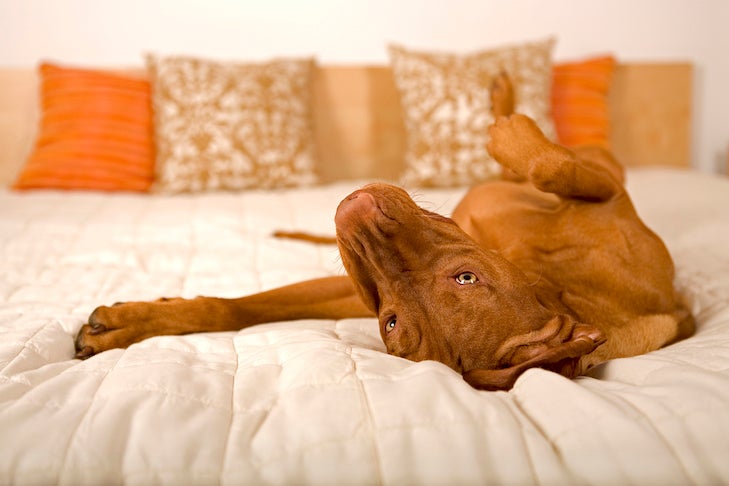Clubs Offering:
For many, spending more time at home during the pandemic meant tons more time with our dogs. If you took note of the way your dog smells, you weren’t alone. Many of us accepted a certain level of dog odors until we were spending time together 24/7 for weeks on end.
“I don’t think you should know that your dog is next to you just by your nose,” says Jackie Campbell, DVM, DACVD, from Animal Allergy & Dermatology of Colorado.
Ashley Bourgeois, DVM, DACVD, from Animal Dermatology Clinic Portland, adds that dogs pick up scents from their environment. Dogs with yards often smell like grass. Dogs from rural homes sometimes smell like hay. “With smaller dogs, their owners hold on to them a lot,” Bourgeois says. “Sometimes they smell like their detergents or perfumes.”


According to Campbell, many of us harbor misconceptions about giving dogs too many baths. She says monthly is a good idea for most dogs, but she sees canine patients who receive weekly baths or even daily showers. Today’s dog shampoos with lipids and ceramides help protect the skin from drying out.
Secondary yeast or bacterial infections on the skin or inside the ears remain the most common medical reasons dogs might smell awful. Allergies often begin the process, which leads to scratching and licking that open the door for infections.
“Secondary skin infections are usually things that we normally live with happily,” Campbell says, “but something went wrong that caused overgrowth.”
Malassezia yeast and staphylococcus pseudintermedius bacteria can overgrow on dogs, causing skin issues and odors. Look for:

Don’t waste time: Searching online or trying to fix things yourself can delay improvement. “Too often,” Campbell says, “I hear from owners, ‘Oh, my gosh! I wish I would have found you sooner. I’ve been dealing with this for two years, and in 30 days, I have a new dog.’ ”
Don’t use home remedies such as:
“Coal tar is a really old product, and it’s sometimes thought of as being more natural,” Campbell says, “but as we became more advanced, we realized that coal tar can act as a carcinogen, and it’s also so stinky.”
Bourgeois explains that veterinarians sometimes do use diluted solutions of vinegar topically to treat yeast infections. She says, “You have to be careful with the concentrations you’re using because they can be really irritating and damaging to the skin.”
Don’t go wild with spray-on fragrances. Bourgeois says that covering up dog odors with body sprays or perfumes can cause more skin irritation.
Don’t make assumptions about costs. In many cases, veterinary prescription products are more cost-effective and clinically effective because they feature higher concentrations of key ingredients such as:
With more people spending more time at home with their dogs, Bourgeois says, “It’s kind of an eye-opener for a lot of our clients to really see what a whole day for a pet with an infection or allergies looks like, and so we are getting more people seeking care because they’re noticing how big of an issue it is.”
Bourgeois adds, “If it starts getting worse and worse, reach out again because we do see things like infections where all of a sudden there are new lesions or your pet is even more uncomfortable. The severity may have increased enough that we feel like its valuable to come in.”
Roxanne Hawn is a journalist and award-winning dog blogger. She is the author of Heart Dog: Surviving the Loss of Your Canine Soul Mate.

 This article originally appeared in the award-winning AKC Family Dog magazine. Subscribe today!
This article originally appeared in the award-winning AKC Family Dog magazine. Subscribe today!
Stinky Dog Skin: Why Does My Dog’s Wrinkly Face Smell So Bad?
If your dog has a wrinkly face you probably want to give him/her LOTS of kisses because they are just
SOOO stinking cute. The problem is the ‘stinking’ part. Your dog’s wrinkles should not smell, but it’s VERY common for certain irritations and infections to cause a foul odor.
Pugs, bulldogs and other wrinkly-faced dogs are  prone to developing skin irritations and infections in between wrinkles. Even if you give your dog the best of the best care it’s still possible for food particles, dirt and moisture to buildup between wrinkles. Once trapped in these tight spaces where it is dark and free of airflow bacteria and yeast have ample opportunity to thrive.Yeast infections are often indicative by a musty scent, but this can also relate to other forms of bacteria. Aside from smell, you may also notice your dog itching at their wrinkles, rubbing against carpets and other surfaces as well as using their paws to scratch.
prone to developing skin irritations and infections in between wrinkles. Even if you give your dog the best of the best care it’s still possible for food particles, dirt and moisture to buildup between wrinkles. Once trapped in these tight spaces where it is dark and free of airflow bacteria and yeast have ample opportunity to thrive.Yeast infections are often indicative by a musty scent, but this can also relate to other forms of bacteria. Aside from smell, you may also notice your dog itching at their wrinkles, rubbing against carpets and other surfaces as well as using their paws to scratch.
If infections persist your dog may begin to develop crusty, inflamed, dry or even raw and pink spots that are just as painful as they appear.
Why Does My Dog Smell Even After a Bath?
So, you’ve tried all of the above methods, and your dog still smells gross. ‘Why??’ I heard you pleading, ‘Why does my dog smell so bad even still? What am I doing wrong?’ Well, my poor soul, there’s a high chance you’ve done nothing wrong. Your dog may just have an infection or bodily that needs your immediate attention.
Dr. Becker Discusses Why Dogs Stink
There isnt a perfume company out there that has invested in “Eau de Dog,” and with good reason. Most of our pooches have a tendency to be malodorous from time to time, whether its the stench coming from the moisture between their toes, their bad breath, or the unmistakable whiff of foul air as they enter the house after a walk in the rain. Yes, even the best dogs can make our eyes water for a variety of reasons.
However, while most odors have a simple solution, some can be caused by more serious underlying problems. Lets take a look at why our four-legged friends smell so bad and what we can do about it.
The number one cause of bad breath in dogs, just like people, is the build-up of plaque and tartar on their teeth. Some small breeds are especially prone to dental problems like gum disease. Another problem specific to certain breeds is Gingival Hyperplasia, the overgrowth of the gums that can harbor small bits of food and produce a rotten smell.
Keeping your dogs teeth clean at home is the first step in solving this problem, but ultimately your pet may need a dental cleaning from a veterinary professional. If you have DefenderPlus coverage offered by AKC Pet Insurance (underwritten by Independence American Insurance Company), you may be reimbursed for a portion of teeth cleaning costs.
Canine flatulence (known to most of us as “dog farts”) is a common problem in dogs, and if your pup can clear the room after passing gas, it is often due to an intolerance to an ingredient in their food.
Working with your veterinarian to switch to a different diet, whether that be grain-free or fish-based, can often solve the problem. However, excessive canine flatulence can sometimes signal an underlying medical issue, so if the air around your pet remains foul, continue to consult your licensed veterinarian until the problem is resolved.
Seasonal or food allergies can cause inflammation of the skin that can lead to excessive oil secretions from certain glands, which can produce a musty smell and even cause skin infections if left untreated.
Poor diet can contribute to your dogs allergies as well, and can also be the cause of other problems, including yeast infections, which can also lead to foul odors. A diet high in carbohydrates and dog kibble that is highly processed can be the root cause of your dogs allergic reactions. If you think this may be the issue, switch your pup over to a high-protein, non-processed dog food, or try using allergy tablets for dogs that can help with these types of reactions and symptoms.
There are many types of bacteria and yeast that can cause canine ear infections. A healthy ear usually has good defenses to fight off the bacteria, but if your dog suffers from allergies or hormonal imbalances, the yeast and bacteria can increase dramatically, causing a dreadful smell. Dogs with hairy or floppy ears, such as Basset Hounds and Springer Spaniels, may have consistent ear problems unless their ears are kept clean and dry.
This is one of the most common causes of stinky dogs. All canine companions have two small scent sacs on their bottoms that act as marking glands, which is why dogs smell rear ends when introduced. If these sacs become impacted, it can cause the dog pain, not to mention result in a extremely smelly secretion that remains on the fur. Another sign your dog has problems with their anal glands is “scooting,” or dragging their bottom on the ground. Make an appointment with your veterinarian if your dog exhibits this type of behavior.